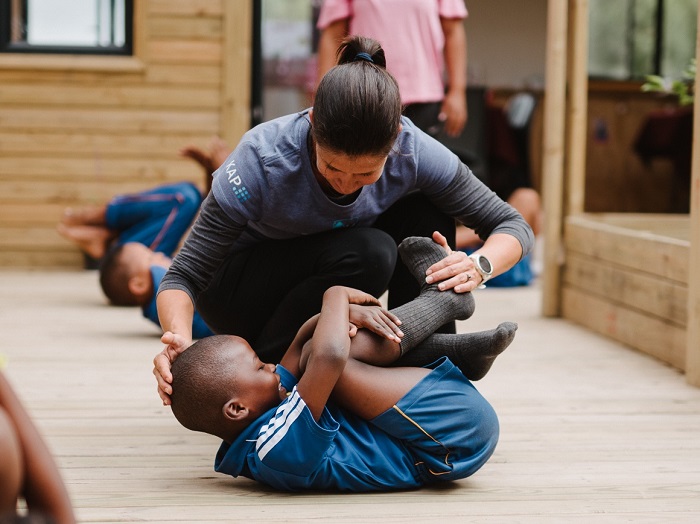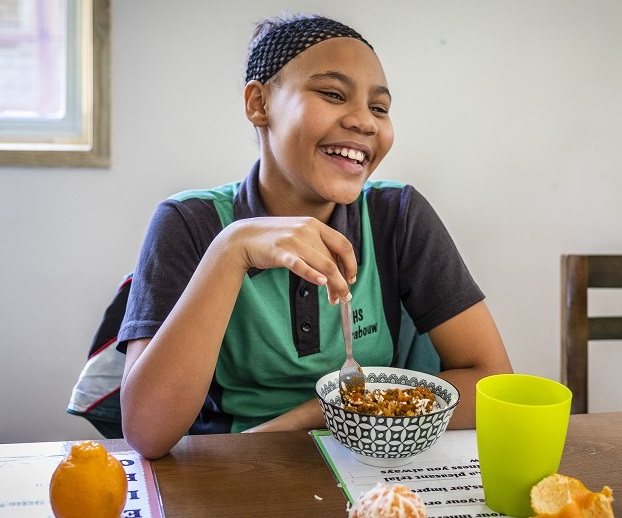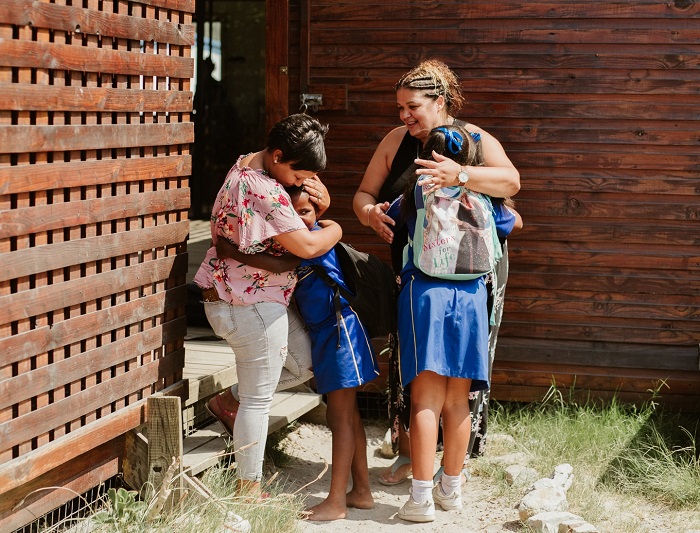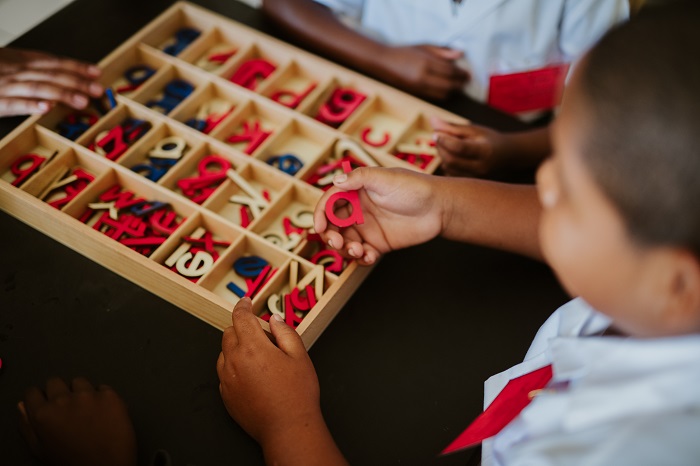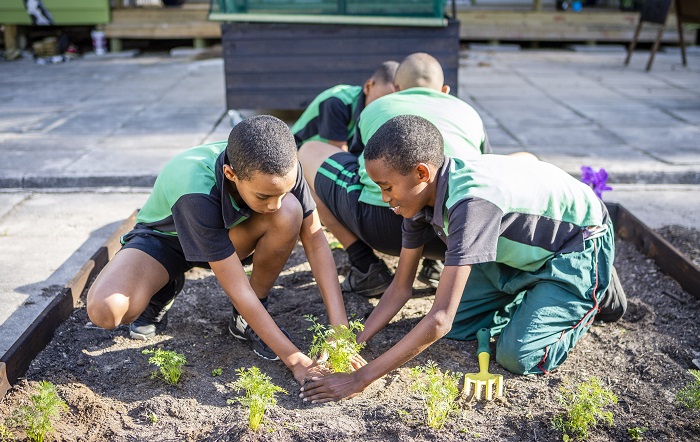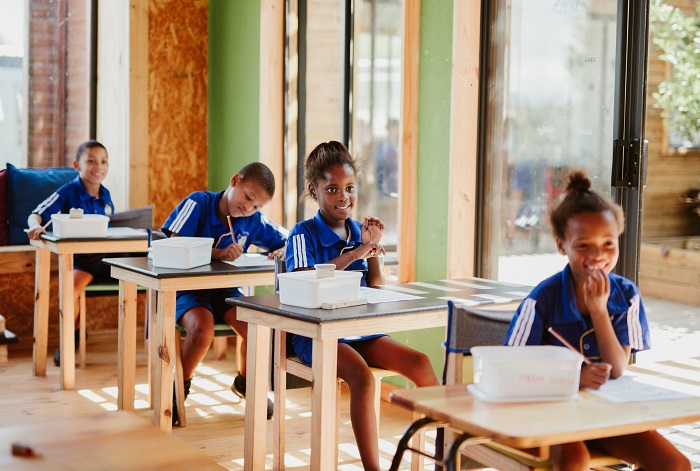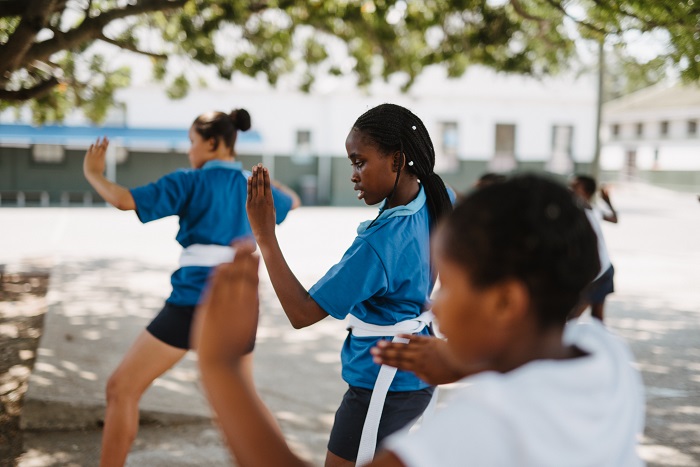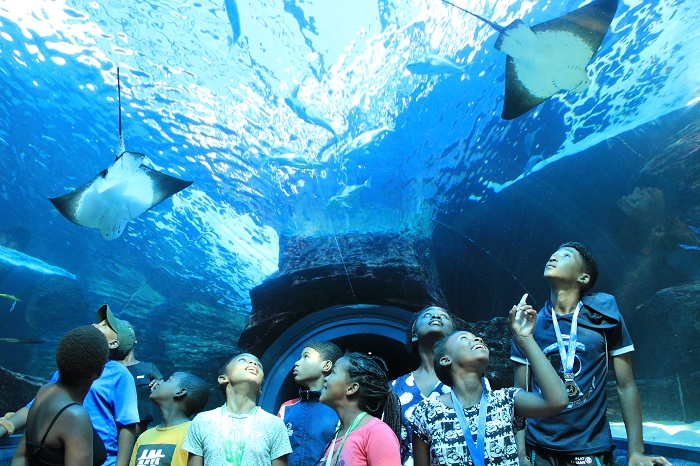The Impact of a Well-Balanced Holistic Approach to Education in Africa
The holistic education programmes provided by SOS Africa to disadvantaged African children extend far beyond just academic support. Our holistic approach to education means that we value the development of the whole person – their unique blend of talents, abilities and personality; plus their emotional, social and ethical development (including a concern for others and their environment). British educator and reformer Charlotte Mason believed that children are “born persons” and should be respected as such. The role of educators should not be to merely transfer information or knowledge to children, but to create a positive and nurturing atmosphere that fosters the development of their whole “selves”.
We also appreciate Maria Montessori’s holistic learning approach, which recognises that children of different age groups have different developmental stages, and therefore will have different needs at each stage.
Holistic Learning and the Body-Mind Connection
The holistic approach to education places importance on children’s physical, mental and emotional well-being, and recognises that the whole person needs to be developed and nurtured for optimal learning to take place. A healthy, well-nourished body aids brain clarity, focus and memory. Also, simply put, a child with an empty stomach will not be interested in learning. We must meet children’s basic needs before we can focus on education. Therefore, we ensure that children at our SOS Africa Education Centres receive a nutritious meal every day.
Traditional education systems normally require students to sit still for long periods of time, but neuroscience shows that movement is actually extremely beneficial for learning. Movement improves oxygen intake and the production of glycogen (glucose) – both essential for brain function. Allowing students to take a “walking break”, or even to do some quick stretching or dancing exercises, can help them refocus and prevent their brain from becoming “overloaded”. [1] Often, new information needs a great deal of repetition to become imbedded in memory, but research shows that children learn much quicker when they are having fun! [2] Holistic educators will employ techniques to help children learn and remember, like clapping, dancing or skipping while doing an activity such as practising times tables.
We know that exercise also improves mental health because of the secretion of helpful neurotransmitters. Dopamine is a ‘feel-good’ reward neurotransmitter that is secreted during exercise. It improves a person’s mood, and also makes them feel more motivated. Ninety-five percent of the body’s serotonin (the calming neurotransmitter) is found in the gut. Teaching children simple breathing techniques will help them relax their gut. As the serotonin sends the message to the brain that the environment is safe, the child will feel calm and ready to learn.
Children who do not feel safe, accepted and loved, will not be interested in learning. While we recognise that exercise aids mental and emotional health, we also realise that most of our students are facing or have faced serious challenges and often trauma. It is important to all our staff and volunteers that we build positive and affirming relationships with our students so that they can thrive in a safe and loving environment. We also arrange sessions with a child psychologist and social worker to provide additional support to our children.
Holistic Learning and the Different Planes of Development
Maria Montessori (1870-1952) is often viewed as a pioneer in the field of holistic education. She was one of the first women in Italy to attend medical school. She faced criticism and even open hostility from her male counterparts, but successfully completed her degree after also studying paediatrics and psychiatry. Maria Montessori began working extensively with children who had cognitive delays and disabilities, leading to the development of what she called “scientific pedagogy”. She was later invited to oversee the care and education of a group of children from low-income families. She was interested in applying her methods to children without mental disabilities and so the first “Children’s House” was established. [3]
Based on her observations of and work with the children, Maria Montessori continued to develop an educational philosophy and approach. She observed four distinct phases or “planes of development” during which children displayed different needs, interests and behaviour.
The first plane of development is from birth to age six and is known as the “Absorbent Mind”. Children in this age group are sensory explorers and Montessori stressed the importance of having hands-on, tactical materials for learning. Preschool classrooms are equipped to help children develop independence and contain tools and materials for practical skills such as pouring, spooning, washing, scrubbing and sweeping. Academic learning for reading, writing and numbers is aided with equipment made mostly from wood.
The second plane of development is known as “Childhood” and includes the age group between six and twelve years of age. During this phase there is a greater focus on using reasoning or critical thinking, as well as imagination. Children in this phase also feel a greater need to identify with their peers. Montessori classrooms for this age group are generally more flexible than a traditional school environment. Students have a choice of activity from within their prescribed range of activities for the week. Materials to aid their learning are still organised neatly on shelves by subject, so that students can exercise independence by selecting the tools they need in order to complete their tasks. [4]
The third plane of development is “Adolescence”. Maria Montessori did not establish an educational programme for adolescents during her lifetime, but she did envision an environment where they would be focused on developing real life skills such as growing food, planning and preparing meals plus designing and building structures. During this time, adolescents need to be prepared to live and thrive in a real-world environment and to contribute to their community.
Even to holistic educators who do not necessarily follow Maria Montessori’s educational approach in the classroom, her philosophy remains inspiring because it focuses on the children and their needs, as well as teaching them practical skills, self-discipline and independence.
Holistic Learning Develops and Fosters Different Types of Intelligence
Traditional education systems focus only on two types of intelligence: mathematical/logical intelligence and linguistic intelligence. However, many psychologists and neuroscientists agree that there are at least 8 types of intelligence. Holistic education believes that every student is different and that their individual strengths should be developed and celebrated.
Dr Howard Gardner is the father of the theory of multiple intelligences, and although many others have since built on and expanded his ideas, his theory on 8 different types of intelligence are a good starting point for identifying our children’s individual strengths.
Other than mathematical/logical and linguistic intelligence, people can also have interpersonal intelligence (the ability to understand the feelings and motivations of others and to interact well with them), intrapersonal intelligence (the ability to understand oneself accurately), kinesthetic intelligence (the ability to control and use movement of one’s body and other tools effectively), spatial/visual intelligence (the ability to interpret and use images, symbols and diagrams), musical intelligence (the ability to use rhythm, melody, pitch and tune effectively) and naturalistic intelligence (a natural affinity for plants and animals and an ability to recognise, identify and understand patterns in nature).
Holistic education aims to help students become well-rounded and well-balanced individuals by exposing them to a variety of different fields such as sports and the arts. However, holistic educators also want to foster those specific gifts, talents and abilities we identify in our students. We do this by giving them ample opportunities to immerse themselves in activities suited to their interests and talents, such as taking them to art galleries and art festivals, park runs and other sporting events, or outings that encourage a love for animals, nature and conservation. Rather than expecting them to be square pegs trying to fit into a round hole, holistic education wants children to thrive because they are pursuing the interests they are passionate about.
Holistic Learning Cultivates a Care for Self, Others and the Environment
Holistic education also focuses on social and ethical development in children. It is important that children have a healthy sense of self-worth and a sense of purpose. They need to know that their lives have value and that they have something to give, simply because of who they are. Several psychological studies indicate that having a sense of purpose leads to health benefits and overall better quality of life. [3] Interestingly enough, this sense of purpose is not just focused on one’s own talents or abilities, but also on how they can be used to make a positive impact on the world around us. Psychologist William Damon and colleagues defined purpose as the “intention to accomplish something meaningful to the self and of consequence to the world beyond the self”. [4] Holistic education is community-focused and helps students understand their role in their community. It does not focus on grades or achievements, but on using one’s strengths and abilities to contribute, uplift and build the community.
Holistic educators want to inspire children to become problem solvers who will not only care deeply about the needs of their communities, but who will also come up with innovative solutions to the challenges in their society.
There is a wide array of challenges in every community and holistic education will encourage students to become aware and ask questions such as:
- How can we improve the welfare of children, the elderly and other vulnerable people in our community?
- How can I make a meaningful impact on the lives of the people around me: my family, friends, school and community?
- How can I make a difference in helping to conserve our planet?
Holistic Learning Prepares Children for the Future
Holistic education wants to prepare children for their future in helping them develop the character and skills needed to build healthy relationships, and to have a meaningful and successful business or career. Helping children develop good character – such as empathy, compassion, integrity, impulse-control and flexibility – will help them to build healthy relationships with family members and friends, as well as future relationships in the home and workplace.
In order to help children develop these abilities, holistic educators need to have a good relationship with their students. They can model good communication and conflict resolution, as well as create opportunities for students to practise them in different settings. For example, to help resolve conflict between students the teacher or mentor might explain how communication is more than words, but that meaning is also conveyed through tone of voice and body language. They can then practise communicating a request, comment or apology in different ways.
When looking at skills needed in the workplace, we can classify them into ‘hard skills’ and ‘soft skills’. Hard skills refer to specific, measurable abilities such as accounting, writing, typing, computer programming or graphic design. Soft skills refer to less measurable skills like time management, organisation, setting and prioritising goals, communication, teamwork and critical thinking (the ability to solve problems, find solutions and apply knowledge).
Critical thinking is usually listed by most employers as the number one skill lacking in the workplace. We use and encourage activities such as puzzles, riddles and logic-based games like Sudoku. Games can be a welcome break from more formal academics, but at the same time it builds valuable problem-solving abilities. Building a jigsaw puzzle is an excellent activity that helps build organisational skills and logical reasoning in children. For older students, teachers and tutors will focus on designing activities that do not merely require students to memorise information, but to apply it to various situations. Albert Einstein said, “The value of education is not the learning of facts, but the training of the mind to think.” Holistic educators most definitely also encourage teamwork and create opportunities for students to solve problems together.
Growth Mindset and Grit
Psychologist Angela Lee Duckworth and her colleagues set out to find which factors or traits determined whether people would be successful in their chosen careers or goals they set for themselves. They studied a wide range of people, such as cadets from a top military academy in the USA, children competing in the National Spelling Bee and even teachers, especially those working in really tough neighbourhoods. They found that the trait most indicative of future success was grit. In a very popular TED Talk, she defines grit as “passion and perseverance for long-term goals. [It is] sticking with your future, day in, day out, not just for the week, not just for the month, but for years, and working really hard to make that future a reality. Grit is living life like it’s a marathon, not a sprint.” [5]
Those are some very inspiring thoughts! Our children need to develop grit, or perseverance, in order to be successful in all spheres of life. She went on to say that the best way to build grit in children is to help them develop a “growth mindset.” Dr Carol Dweck developed this idea and explains it as the belief that the ability to learn is not fixed. We can always learn and grow more. Failure is not seen as a negative experience, but as an opportunity to learn. In fact, Dr Duckworth says that we should be willing to fail, to be wrong, and to start over. Life is filled with challenges, but passion and grit will enable children to push past difficulties and keep going until they succeed.
Holistic education is truly a mammoth undertaking and requires a dedicated team of parents, educators and various other members of the community who have a passion for children and their future. William Yeats said “Education is not the filling of a pail, but the lighting of a fire”. Our hope is that all our students at SOS Africa will be ignited with a passion for their own future, as well as a passion to make a meaningful impact in their communities and in their country.
For the full article please visit: A Holistic Approach to Educating Children in Africa (sosafrica.com).
To Sponsor a child through SOS Africa please visit:
Sponsor a Child in Africa | Sponsorship for African Children (sosafrica.com).
Sources:
- Keller, G. (2020). “The Butt, Gut, Heart, Brain Link” in Zip the Crocodile, Keller House Pty Ltd, Cape Town
- Keller, G. (2020). Zip the Crocodile, Keller House Pty Ltd, Cape Town
- Maria Montessori (2023, Feb 28) In Wikipedia. https://en.wikipedia.org/wiki/maria_montessori
- Montessori Education ( ) In Wikipedia. https://en.wikipedia.org/wiki/montessori_education
- Berns-Zare, I. (2019) “The Importance of having a sense of purpose.” Psychology Today, https://www.psychologytoday.com
- Damon, W., Menon, J. & Bronk, K.C. (2003). “The development of purpose during adolescence.” Applied Developmental Science, 7(3), 119-128
- Lee Duckworth, Angela. “Grit: The power of passion and perseverance.” TED, June, 2016, http://t.ted.com/tScP3K8
Press release distributed by Pressat on behalf of SOS Africa, on Monday 17 July, 2023. For more information subscribe and follow https://pressat.co.uk/
Holistic Education Holistic Learning Emotional Development Children School Empowerment Teaching Nutrition Learning Support Montessori Charities & non-profits Children & Teenagers Education & Human Resources Health Lifestyle & Relationships Opinion Article Women & Beauty
You just read:
The Impact of a Well-Balanced Holistic Approach to Education in Africa
News from this source:



